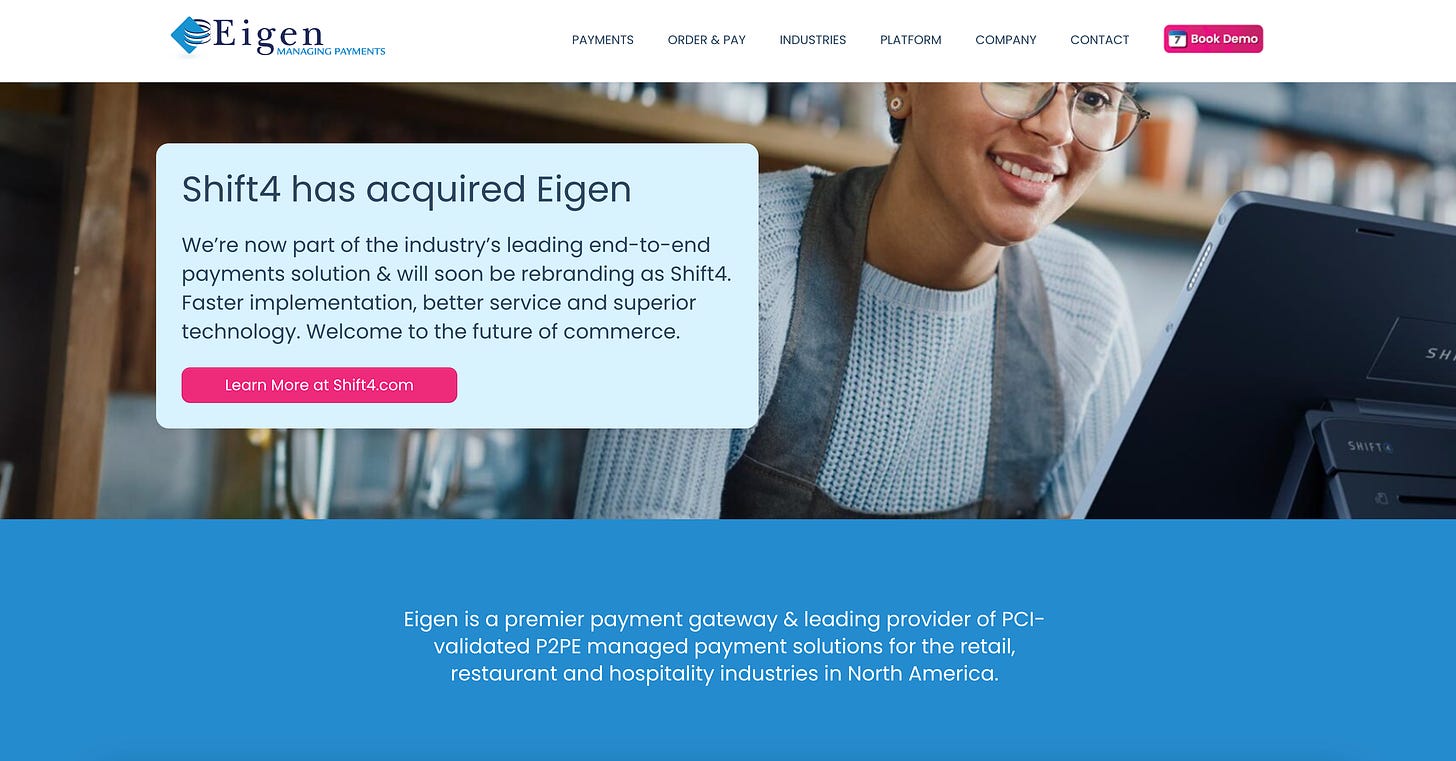Google's quantum chip Willow will crack Bitcoin's encryption? 😳🤖; Ripple's stablecoin wins critical NY regulatory approval 😳🪙; Shift4's global expansion accelerates with big FinTech M&As 😤💸
You're missing out big time... Weekly Recap 🔁
The ultimate list of resources for building and scaling billion-dollar companies 🦄 [1,500+ pages of knowledge, data and advice to launch & scale your next unicorn startup in 2025]
AI 100: Top Artificial Intelligence Startups of 2024 🤖💸 [these companies raised $28B already. Find whose backing them, unlock their exclusive pitch decks & learn from the best 🚀]
The Ultimate List of Resources to Promote Your Startup for FREE 🚀 [380+ free places to post your project or startup to maximise exposure & accelerate growth ]
The Rise of Stablecoins: Market Cap Hits $200B as DeFi Yields Drive Adoption 📈🪙 [key drivers pushing this, why it matters & what’s next + some bonus reads on crypto & stables inside]
Norwegian FinTech makes history as first Apple Pay competitor on iPhone📱🇳🇴 [what it’s all about, why it matters & what’s next + bonus dives into Apple & Co]
Mercado Libre and Nubank Battle is Reshaping Latin American Banking 🥊🏦 [holistic recap of what’s happening, why it matters & what’s next + bonus deep dives into the latest financials of NU & MercadoLibre and why you should be super bullish on both of them]
Investment API provider Upvest secures €100M Series C and doubles valuation amid European expansion 💸📈 [what does this tell us & what can we expect next + bonus access to Upvest’s pitch deck & 1,500+ pages of resources to help you build and scale your startups]
Gen Digital buys MoneyLion for $1 billion 💸🤝 [what this means & what it tells us about the future of FinTech + bonus deep dive into MoneyLion & their latest financials and some priceless M&A templates that can save you billions]
Klarna expands European presence through eBay partnership 🤝🛍️ [why it matters & what’s next + bonus deep dive into Klarna & co]
Stablecoin-backed neobank KAST aims to redefine FinTech 😳🏦 [what’s their USP & why it’s interesting + bonus dives into stablecoins and why you cannot afford to ignore them]
50+ Pitch Decks FinTechs Used to Secure Over $2 Billion in VC Funding 📱💸 [unlock an exclusive trove of investor-approved decks from top FinTech innovators & learn strategies that turned early pitches into industry-changing startups]
As for today, here are the 3 incredible FinTech stories that were transforming the world of financial technology as we know it. This was yet another incredible week in the Finance 2.0 space so make sure to check all the above stories.
Google's quantum chip Willow will crack Bitcoin's encryption? 😳🤖
The news 🗞️ The crypto world buzzed with concern when Google GOOGL 0.00%↑ unveiled its latest quantum computing breakthrough - the 105-qubit Willow processor.
Some Bitcoin holders feared this technological advancement might compromise their digital assets' security. However, a closer look at the numbers and technology reveals these fears are premature.
Let’s look at this and see what it’s all about.
More on this 👉 First and foremost, we must realize that quantum computers operate fundamentally differently from classical computers, using quantum bits (qubits) that can exist simultaneously in multiple states.
Google's Willow chip demonstrated impressive capabilities by performing complex calculations in five minutes that would take traditional supercomputers roughly 10 septillion years to complete. Sure, this sounds alarming, but it's crucial to understand the vast gap between current quantum capabilities and what's needed to crack Bitcoin's encryption.
Follow the numbers 📊 Bitcoin uses a 256-bit encryption system based on the Elliptic Curve Digital Signature Algorithm (ECDSA). Breaking this encryption would require a quantum computer with over 1 million stable qubits - nearly 10,000 times more powerful than Willow's current 105 qubits.
More conservative estimates suggest needing approximately 317 million physical qubits to crack a single Bitcoin key within an hour.
That said, the recent market jitters and temporary sell-offs following Willow's announcement reflect a misunderstanding of the technological gap. Oh, well… 🤷♂️
Experts in both quantum computing and cryptography estimate it will take at least 10-20 years before quantum computers could pose any meaningful threat to Bitcoin's security infrastructure.
On top of that, the crypto community isn't waiting for quantum computers to catch up. Developers are actively working on quantum-resistant solutions, including post-quantum cryptography protocols. These developments suggest Bitcoin's security will evolve alongside quantum computing advances.
✈️ THE TAKEAWAY
What’s next? 🤔 So in a nutshell, rather than viewing Willow as a threat, the crypto community should see it as a catalyst for innovation. This development is hence pushing the boundaries of both quantum computing and cryptographic security, potentially leading to:
Enhanced encryption standards for all digital assets
Development of quantum-resistant blockchain protocols
Increased investment in cryptographic research
Greater collaboration between quantum computing and blockchain experts
Sounds in fact bullish to me.
ICYMI:
Ripple's RLUSD stablecoin wins critical NY regulatory approval 😳🪙
The news 🗞️ Crypto giant Ripple has just secured a significant regulatory milestone with the New York Department of Financial Services (NYDFS) approving its RLUSD stablecoin, marking a strategic expansion of the company's financial services offerings.
The approval positions Ripple to compete directly with established stablecoin leaders USDT and USDC in the $192.8 billion stablecoin market.
Let’s take a quick look at this.
More on this 👉 RLUSD will launch on both the XRP Ledger and Ethereum blockchain, backed by a combination of US dollar deposits, short-term Treasury bonds, and cash equivalents.
The stablecoin has already secured partnerships with major exchanges including Uphold, Bitstamp, and Bitso, along with liquidity providers B2C2 and Keyrock to support its rollout.
The NYDFS approval carries particular weight in the cryptocurrency sector, as New York maintains some of the strictest regulatory requirements through its BitLicense framework.
This regulatory clearance not only allows Ripple to operate in New York but also signals strong compliance credentials to institutional investors.
✈️ THE TAKEAWAY
What’s next? 🤔 First and foremost, the institutional focus of RLUSD could reshape the stablecoin landscape. While competitors like Circle's USDC and Tether's USDT currently dominate with about 90% market share, Ripple's established relationships with money transfer businesses and banks through its Metaco acquisition provide unique advantages for institutional adoption. However, Ripple faces significant challenges. The XRP Ledger's relatively low daily active users (around 13,000) compared to other blockchain networks could limit RLUSD's initial traction. The company must therefore demonstrate it can attract and retain institutional users in an increasingly competitive stablecoin market where new entrants like PayPal's PYUSD and Ethena's USDe are offering innovative incentive programs. Zooming out, if Ripple can leverage its regulatory approval and existing business relationships to drive significant transaction volume, it could accelerate the mainstream adoption of blockchain-based payment solutions. The launch of RLUSD thus represents a pivotal moment not just for Ripple but for the broader institutional adoption of cryptocurrency payment solutions. The next 12-18 months will be crucial in determining whether Ripple can execute on its vision of becoming the "gold standard for enterprise-grade stablecoins." Interesting times ahead.
ICYMI:
Shift4's global expansion accelerates with strategic FinTech acquisitions 😤💸
Following the money 💸 In a series of strategic moves to expand its global presence, Pennsylvania-based payment processing giant Shift4 FOUR 0.00%↑ has recently completed multiple acquisitions across international markets.
The company has acquired Eigen Payments in Canada, Card Industry Professionals (CIP) in the UK, and several other payment technology firms, demonstrating an aggressive expansion strategy in the FinTech sector.
Let’s take a look at this and see why it matters.
More on this 👉 The acquisition of Eigen Payments, which serves the hospitality and entertainment sectors, aligns with Shift4's existing customer base in sports stadiums and venues. While financial terms weren't disclosed, RBC Capital Markets analyst Dan Perlin notes that Shift4 will likely implement its standard integration playbook, encouraging Eigen's merchant base to transition to Shift4's platform through strategic fee structuring.
The CIP acquisition provides Shift4 with a significant foothold in the UK market. Founded in 2017 by Ciaran Savage, CIP processes over £60 million in monthly transactions and serves small and medium-sized enterprises with point-of-sale and online payment solutions.
The deal provided a successful exit for Mercia Ventures, which achieved a 2x return on its investment made through regional development funds.
Zoom out 🔎 These acquisitions follow Shift4's earlier 2024 purchases, including a $250 million acquisition of Revel Systems in May, German point-of-sale provider Vectron Systems in June, and Canadian fintech Givex in August.
The company's rapid expansion clearly suggests a deliberate strategy to build a comprehensive global payments infrastructure.
✈️ THE TAKEAWAY
What’s next? 🤔 At the core, these acquisitions position Shift4 as an increasingly significant player in the global payments landscape. The company appears to be building a unified commerce platform that can serve businesses across multiple markets and sectors. Looking ahead, this consolidation trend in the payments industry implies a few things. First, Shift4's expansion into international markets suggests a growing focus on creating seamless cross-border payment solutions, which could be particularly relevant as digital payment technologies continue to evolve Second, the acquisition of companies with established merchant relationships in different regions could accelerate the adoption of new payment technologies. With William Blair analysts suggesting Shift4 might consider acquiring Lightspeed Commerce, the company appears poised for continued expansion, particularly in markets where digital payment adoption is growing. Zooming out and looking at the broader industry perspective, this consolidation trend might signal a shift toward more integrated payment solutions that combine traditional payment processing with newer technologies (think here stables and crypto as well). And as the payments landscape continues to evolve, companies with comprehensive international capabilities and diverse technological solutions will likely be best positioned to adapt to changing market demands and regulatory requirements. You aren’t bullish enough.
ICYMI: Shift4's payment processing empire continues to expand globally 📈🌎 [dicing into their Q3 2024 financials, breaking them down to see whether Shift4 is worth your time & money in 2024 and beyond]
🔎 What else I’m watching
Klarna Fined $50 Million for AML Violations 🚨 Klarna has been fined $50 million by Sweden's Financial Supervisory Authority for anti-money laundering (AML) violations. An investigation revealed significant deficiencies in Klarna's risk assessment and customer due diligence procedures. The regulator cited failures in assessing how Klarna's products could be used for money laundering or terrorist financing. Klarna, while not issued an official warning or authorization withdrawal, emphasizes its commitment to a secure financial environment and notes that no instances of money laundering were uncovered. ICYMI: Klarna expands European presence through eBay partnership 🤝🛍️ [why it matters & what’s next + bonus deep dive into Klarna & co]
Standard Chartered Partners with Paxos for Stablecoin Reserve Management 💵Standard Chartered has agreed to provide cash management, trading, and custody services for Paxos stablecoins, including Global Dollar (USDG) and Lift Dollar (USDL). The bank will support Paxos' global tokenization platform with integrated banking capabilities. ICYMI: The Rise of Stablecoins: Market Cap Hits $200B as DeFi Yields Drive Adoption 📈🪙 [key drivers pushing this, why it matters & what’s next + some bonus reads on crypto & stables inside]
Revolut Seeks Banking Licence in New Zealand 🏦 Revolut has applied for a banking license in New Zealand, aiming to expand its services after processing over NZ$350M in transactions since its 2023 launch. The license would enable Revolut to offer interest-bearing savings products and a broader range of credit options, challenging traditional financial institutions.
💸 Following the Money
Brighty, a Swiss digital finance platform for crypto-card payments, has secured $10M in funding from Futurecraft Ventures to expand its presence in Europe and the UK.
Ayan Capital, a London-based Islamic fintech, has secured £2.8M in equity funding to expand halal car finance and other Islamic finance products in the UK.
Swedish-based spend management platform Mynt has raised EUR 22M in a Series B funding round as it aims to expand across Europe and the UK.
👋 That’s it for today! Thank you for reading and have a relaxing Sunday! And if you enjoyed this newsletter, invite your friends and colleagues to sign up:














This is gold. Thank you as always!